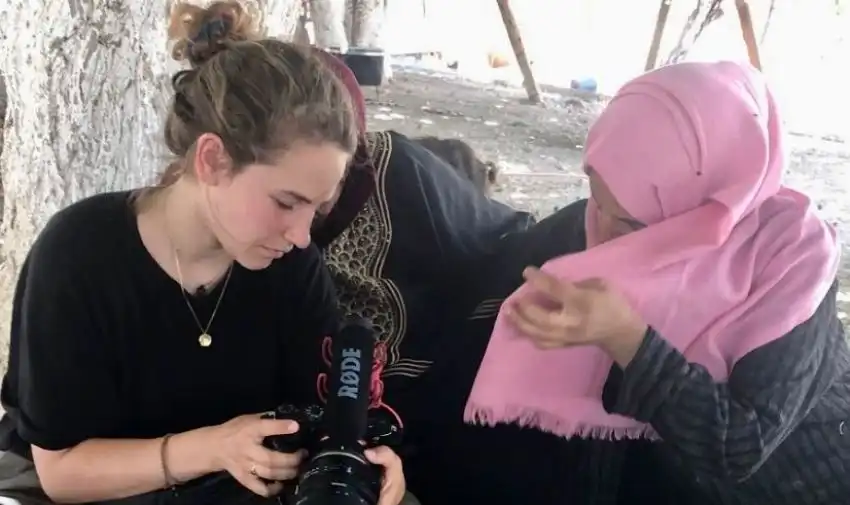Home>"I built an important network that proved very useful once I became a freelancer"
19.07.2022
"I built an important network that proved very useful once I became a freelancer"
Sharon Aronowicz, graduate from the Joint Master in Journalism and International Affairs.
May you describe your academic and professional background?
I completed my bachelor’s in Communication and Middle Eastern affairs and started my master’s degree two years later. During these two years, I spent one year traveling in Latin America and in the second I worked as a reporter for i24news in Tel Aviv. I felt I needed life and work experience in order to decide what kind of journalism I wanted to do which led me to apply to the joint Journalism School / PSIA master’s degree, with a focus on human rights and humanitarian action, as well as video journalism.
What is your job title today? How is your daily routine?
Once I finished my degree, I flew back to Israel to cover the 2021 Israel-Palestinian crisis as a freelance video journalist. I started freelancing for different media, such as Arte Journal, RTS and TV5 Monde, mainly filming, but I often found myself replacing reporters on the ground to do some live coverage and write stories myself. I found my place among the foreign journalists in the region and work became recurrent. That year, I filmed documentaries for Bloomberg, Arte and M6. Today I do not actually have a daily routine which is what I love about my job. Every day on the ground is different. When I am not on the field, my job consists of keeping a close eye on Palestinian and Israeli affairs. I send weekly pitches to various media for whom I have become a regional correspondent. Freelancing means having an overwhelming amount of work during important events, followed by very calm periods of time where I can focus on personal journalistic projects.
What were the main takeaways from your degree?
As I had a clear idea of what I was looking for in this degree, I concentrated my classes on the filming and editing and they proved very useful as soon as I graduated. Being a journalist today requires a lot of multitasking. Knowing how to film isn’t enough, and I am very grateful I realized it in school. Once I was on the ground, knowing not only how to film, but also to write and edit my stories gave me an added value that made all the difference. The combination of the journalism school and PSIA was very important for me, providing the international dimension to my degree I was looking for, as I knew I wanted to work abroad. It was a good balance of practical and theoretical classes, and a very interesting mix of students and teachers between the two schools, many with whom I am still in touch with to this day.
What memories did you keep from your school, your cohort, your teachers?
It was a difficult period due to the Covid epidemic and many (most) classes online. However the teachers were very present, helpful and encouraging and I was fortunate to have amazing classmates, many of them became very close friends and I am very grateful for that. I built an important network that proved very useful once I became a freelancer. Most teachers worked as journalists and I felt comfortable reaching out when I needed guidance in the professional world.
What advice would you give to a student who would like to become a journalist?
I would collect as much experience as possible. Whether it is work experience or traveling, there is no better way to learn than to be on the ground, meeting people and listening to stories. I was so inspired by my travels. It encouraged me to get out of my comfort zone, inspired me to be creative in my work and I believe it made a difference today. I would also encourage students to learn languages. It may seem obvious, but it will make all the difference on the ground. During your master's is a good time to do so since you have so many language classes available with great teachers.
